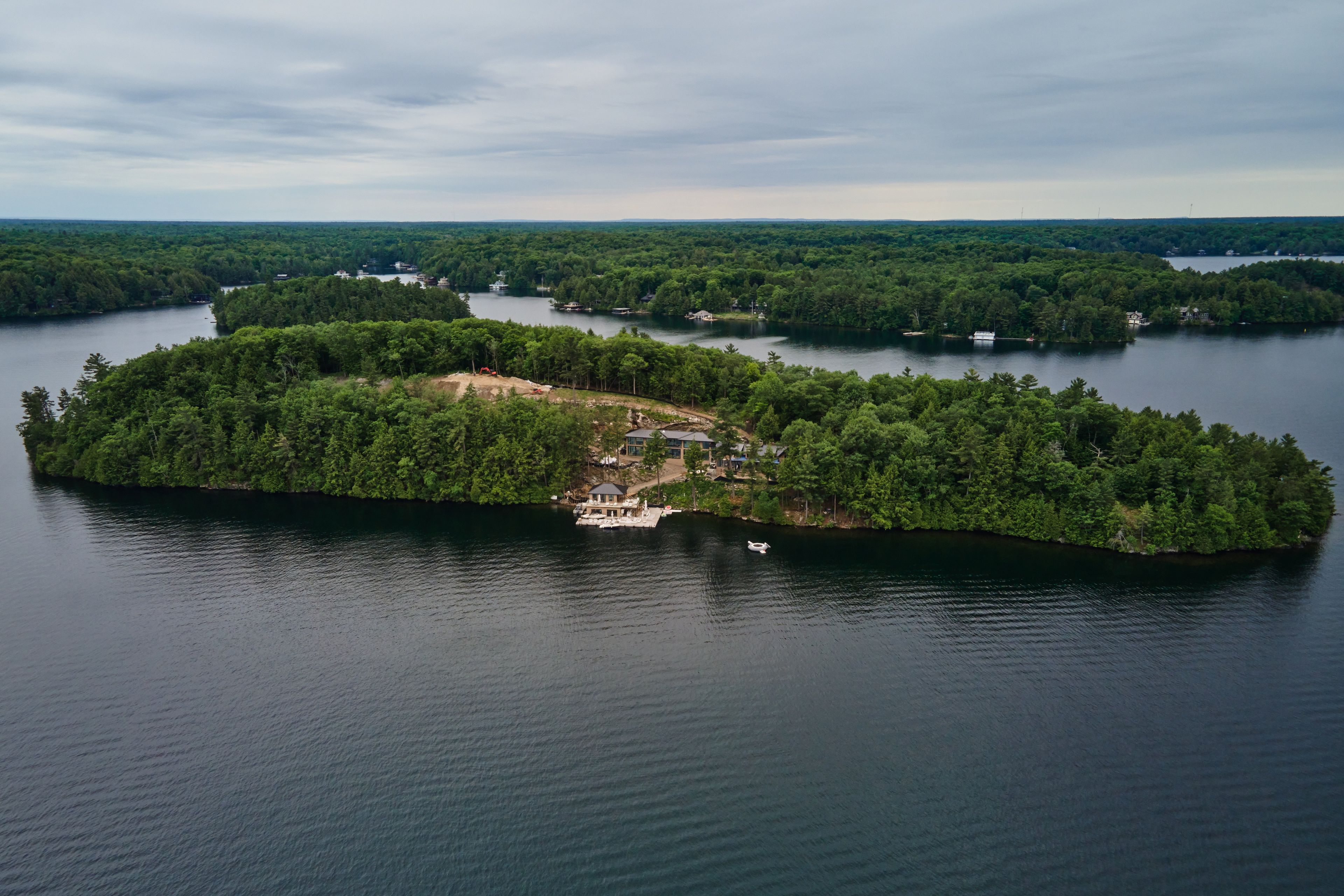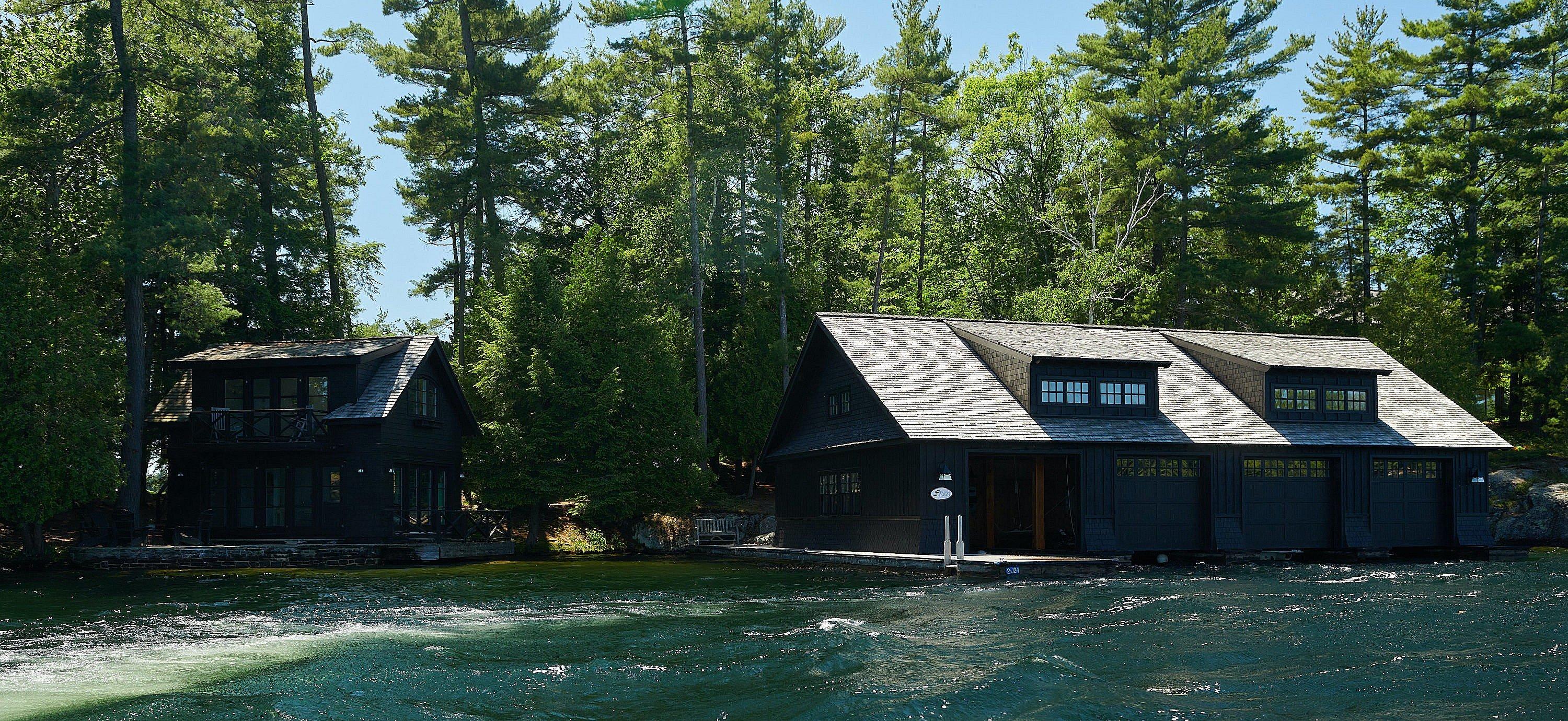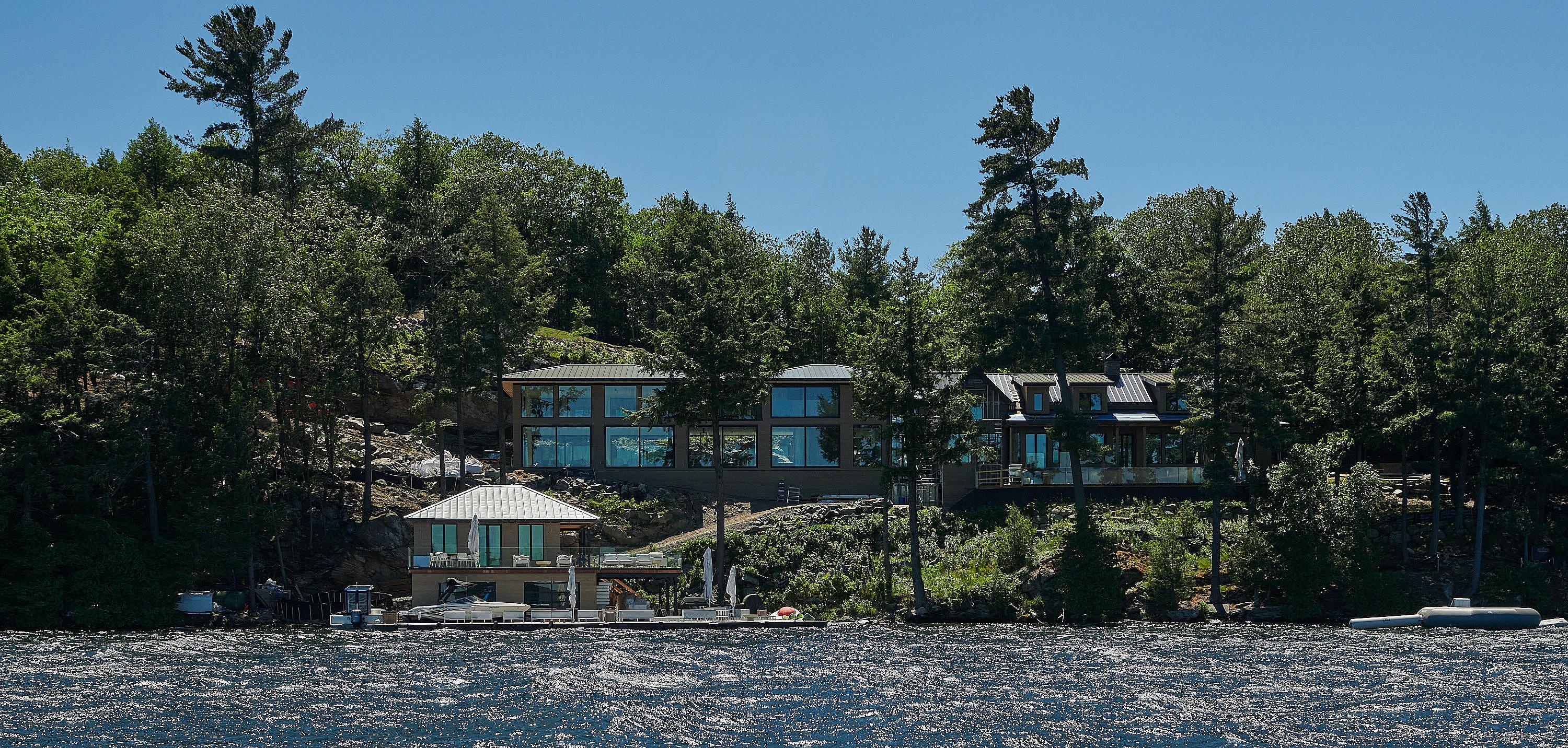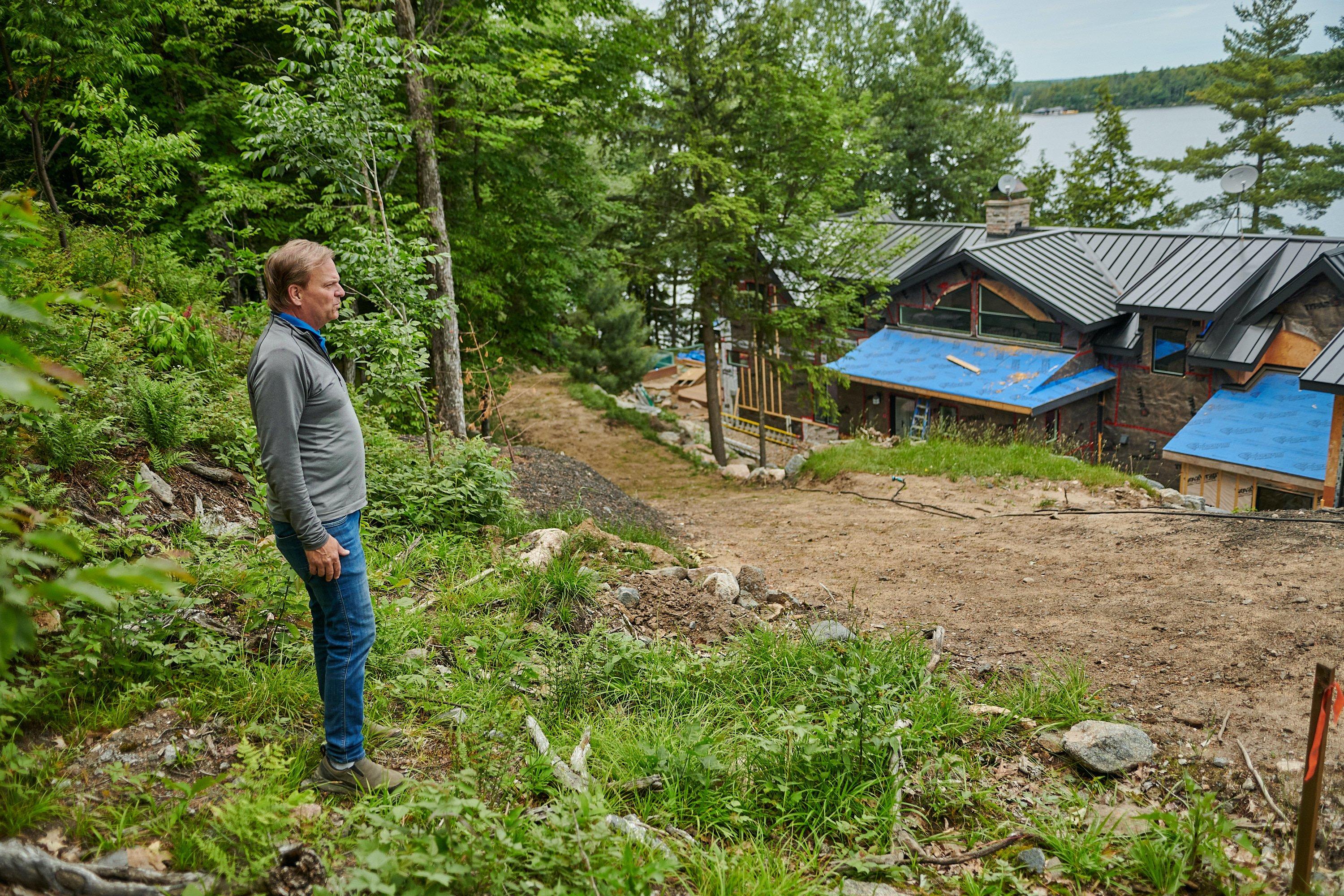The battle for the soul of Muskoka
A Toronto real estate developer is building a mansion on Ontario’s fanciest leisure lake. The neighbours are doing whatever they can to stop him.

Share
July 19, 2022
It was the type of warm spring day that had brought Roger Oatley to Muskoka for more than two decades: towering green trees, fresh air, and boats with familiar faces welcoming everyone back to Canada’s most coveted cottage country.
En route to his summer home in May of 2021, Oatley, a semi-retired personal injury lawyer, drove his boat past Sugarloaf Island: 14 quiet acres filled with white pines, hemlocks and cedars. Only this time he saw a huge gap of missing trees along the shoreline. The opening revealed that a massive chunk of Canadian Shield—the exposed Precambrian rock had been blasted to bits. Oatley thought it looked like a quarry right in the middle of Lake Joseph.
His own cottage was on an island across from Sugarloaf, so he boated past the construction zone each time he headed toward the mainland. On one trip, Oatley docked his boat at Stills Bay Landing and bumped into Joe Azouri, a successful Toronto real estate developer. Oatley knew that Azouri, a Muskoka newcomer, was responsible for the disruption on Sugarloaf Island—he was building a massive cottage. Behind Azouri that day, a sign read: “Quiet neighbourhood. Don’t ‘wake’ it up.” It was a brief conversation. Oatley told Azouri that he’d destroyed the island. Azouri replied that the work had been approved by the Township of Muskoka Lakes. The two haven’t crossed paths since.
Oatley launched a Change.org petition naming and shaming Azouri, with a drone photo showcasing a huge gap where decades-old trees once stood tall. He called for Azouri’s building permits to be revoked until the property was properly remediated.
Oatley sent the link to 20 people. By the end of the day, the petition had 170 signatures. A day later, it had surpassed 500. By the 10th day, more than 2,000 people had signed on, and they weren’t shy to air their feelings in the comments: “I am living in despair witnessing the wanton, selfish, ignorant destruction of our slice of heaven.” “Seeing what these ignorant rich people are doing absolutely disgusts me to my soul.” “The owner of this property has now ruined not only their property but their reputation as well—just leave Muskoka as soon as possible.” “This needs to stop. We are losing Muskoka.”
Azouri’s property became a tourist attraction in Lake Joseph. Muskokans drove their boats by the property to survey the damage. A few of them would stop and shout obscenities if they saw people relaxing atop Azouri’s boathouse, though Azouri says he didn’t hear anything of the sort.
By this point, locals had submitted complaints to bylaw enforcement, who sent an officer to investigate and take photos. A stop-work order was issued on June 8, 2021. Azouri was charged with contravening the township’s tree conservation and site alteration bylaws, matters that are still before the Provincial Offences Court in nearby Bracebridge. Azouri says the charges surprised him, and that they were only laid after the petition was circulated and the media became involved. He does not believe he is guilty of any offence.
Oatley’s message to local politicians and future newcomers was loud and clear. “This petition could be a model for controlling private development in the future,” Oatley wrote on Change.org amid a groundswell of support. “Send it to every contractor, architect and interior designer you can think of so that they will tell their clients going forward that the same thing will happen to them if they don’t obey the township’s bylaws.”
Money has always been synonymous with Muskoka: the New York Times once dubbed it the “Malibu of the North.” If you can afford a place on Lake Joseph, your neighbours will include Cindy Crawford, Kevin O’Leary and Kenny G.
And for as long as there’s been money in Muskoka, there’s been tension about how it should be spent. Newcomers want to build bigger and better, while many long-time residents want control over how the area is developed. The conflict goes as far back as the early 1900s, when there were enough Pittsburgh business tycoons building lavish cottages along one stretch of Lake Muskoka that they dubbed the place “Little Pittsburgh.” Locals eventually adopted a different term for the area: “Millionaire’s Row.” By 1993, the average price for a house along the big three lakes—Lake Joseph, Lake Muskoka and Lake Rosseau—was about $225,000. It hit the $1-million mark around 2005, a time when realtors would joke that all of Muskoka had become Millionaire’s Row.
Nowadays, a million dollars won’t cut it—at least not for good property on the water. A small, basic, non-winterized cottage in need of significant repairs might fetch a million, says Phil Harding, the mayor of Muskoka Lakes, who also works in real estate. The average property on the lake, he says, is probably worth somewhere between $3 million and $5 million.
For decades, the long-time residents—Old Muskokans, they’re often called—have condemned the changes that keep coming with each wave of wealthy newcomers. Clusters of boathouses blight views of the shoreline as seen from a canoe; noise from high-powered boats scare away fish and wildlife; trees are razed to build cottages that some Canadians would characterize as monster homes.

In 1990, the Muskoka Lakes Association launched a 10-week, $15,000 campaign dubbed “Take Back Your Lake,” with a promise to photograph those loud, careless boaters and shame them in a full-page newspaper ad. About a decade later, a group of locals came together to form the Muskoka Fair Tax Coalition in response to rising property taxes, which Muskokans blamed on the influx of rich celebrities and athletes. In 2011, a group of cottagers founded the non-profit Safe Quiet Lakes to educate locals on proper boating etiquette, though it seems to have had little success: according to their 2021 survey, the perceived amount of boat traffic, boat noise and boat wake damage is much worse than it was five years ago.
On one level, these protesters are battling over a landscape that defines Canadianness—loon cries, crystalline waters, Precambrian rock, and wind-bent pines seemingly plucked from Group of Seven paintings. But the complaints are also underscored by class judgment, born of growing tension between old money and new. The pine-and-paddle iconography, after all, is one constructed and embraced over the past century by the mostly well-off, mostly white sons and daughters of North America’s big eastern cities, their families enriched by industrial boom times, their cottages passed down through generations.
Now, soaring property values and property taxes have priced many long-time residents out of the area. Gone are the days when a moderately successful businessperson, lawyer or doctor could buy in, says Peter Kelley, a Muskoka Lakes councillor. “That kind of a career likely won’t fit the bill. It’s extraordinarily successful entrepreneurs for the most part.”
The new residents tend to set a much larger footprint, Kelley notes, building houses with more amenities and more ostentatious presentations. On Lake Joseph’s north end, there’s a stretch of shore with several cottages so lavish it has its own nickname: Billionaire’s Row.
Joe Azouri didn’t know why he was suddenly being singled out. He had regularly rented cottages in the area for extended periods of time. His kids went to summer camps in Muskoka. When he acquired the five-bedroom, four-bathroom Sugarloaf property in 2020 for $3.2 million, he thought the timing was perfect given the age and stage of his family. He immediately started planning a renovation of the existing 2,115-square-foot cottage, plus a 2,540-square-foot addition. The place would be big, but by no means the biggest out there.
He obtained a site plan agreement from the township for the job, including provisions for the revitalization and revegetation of the property after the work was completed. He hired the best contractors he could find with experience around Muskoka. The project required excavators and backhoes, so he had to build a temporary access road for heavy machinery coming in by barge. “The road took some twists and turns because of the pervasive rock and our commitment to alter the natural features of the property, to a minimum,” Azouri says, via email. “The cottage addition, the two septic systems and the road construction did require unavoidable tree cutting and interference with vegetation and some blasting of rock. Again, the township was well aware of our plans as reflected in the detail of the site plan agreement and the permits.”

Azouri runs Amexon Development Corp., which bills itself as one of Toronto’s largest suburban developers, owning and managing a portfolio of office, retail, hotel and residential properties. Business is good: the company recently unveiled plans for five condo buildings and a three-acre park near Toronto’s North York General Hospital, to be called the Residences at Central Park. He’s kept a relatively low profile, aside from getting his picture taken at high-profile charity events like the Wanderluxe Gala, the Butterfly Ball and the Grand Cru Culinary Wine Festival. All of that changed when he added a Muskoka cottage to his personal portfolio.
The story of Sugarloaf is by no means unique. From Azouri’s property, you can see Caniff Island, which has also had extensive development near the shoreline. A tour around Lake Joseph offers a showcase of homes so luxurious that calling them cottages would be a misnomer. Coach houses. Tennis courts. People riding Pelotons in their glass-walled boathouses. Some properties have pools built right next to a lake. Azouri says that aerial photographs taken during the early stages of construction of those properties would leave the same negative impression. “In no way does the township discourage projects such as ours,” he says. “In fact, their unstated policy would be to encourage it.”
The construction industry is by far the biggest employer in town. In Bracebridge, a quarter of the population works in that sector. In the District of Muskoka, the construction value for building permits in 2018 totalled $120,877,656. But what drives the local economy can also come at the hefty price of destroying the natural assets that make Muskoka so desirable in the first place.
Politicians have made various attempts to protect the waterfront. Owners were once required to build their cottages at least 35 feet from the water’s edge; today, properties must be at least 66 feet back. This change had unintended consequences. People with waterfront property weren’t always keen to look at rocks and trees: they wanted to see the water. So some owners, if they couldn’t take down the trees, instead simply cut off the branches—sometimes 40 or 50 feet high in the air—until the trees end up looking like, as some locals call them, Muskoka palms. “It takes hundreds of years for these saplings to grow from the crack of a rock to a 50-foot mature pine tree,” says David Pink, director of development services and environmental sustainability for the Township of Muskoka Lakes. “And then it all disappears in one weekend with a chainsaw.”

As the township approves more development, its meagre corps of bylaw officers can’t get out and patrol sites before the damage is done. Pursuing penalties and charges is becoming part of the township’s day-to-day process, but the current maximum fine for contravening the site alteration bylaw is only $10,000 for a first offence and $25,000 for subsequent convictions. “If you’re building a $15-million cottage, fines like this are a line item on the budget,” says Kelley, who has owned a cottage on Lake Joseph for 20 years and has been a councillor since 2018. “As a council, we need to get creative and look at more consequential ways to stop the behaviour.”
Azouri’s construction site is certainly bigger than some on the lake. Unlike city construction zones, where boards obstruct the public’s view of a giant hole in the ground, Muskoka building sites stand out—especially when they’re on a relatively small island with a handful of properties and no roads in a high-traffic boating area in the middle of Lake Joseph.
The drone photo from the Change.org petition shows the worst of the damage—a huge expanse of trees missing in the middle of Sugarloaf—although the property to the south, belonging to a mergers and acquisitions lawyer named Adam Givertz, also had a number of trees taken down. His name did not appear in the petition, but according to Mayor Harding, that property had no approvals to do anything. Givertz, who declined interview requests for this story, is also charged with allegedly contravening the town’s bylaws, as are several companies who worked on Sugarloaf. Those cases are still before the courts.
So among all the massive residential construction projects in this part of cottage country, why did one wealthy Toronto developer suddenly become the face of Muskoka overdevelopment? As with most things real estate, it probably comes down to location.
Sugarloaf Island was so named because, from a distance, it looks like a big lump of sugar. On its crest, one of the highest points along this stretch of Lake Joseph, Hugh Smith, a builder with many nearby cottage projects under his belt, had long dreamed of constructing an outbuilding for his future dream house. It would be a place where he could stare eastward as the morning sun peeked through some of the very trees he and his siblings planted nearly half a century ago.
Smith was about 11 when he first visited Muskoka. His parents rented a cottage on Lake Joseph’s Governors Island for two seasons in the early 1970s. He and his siblings would spend their summers jumping into the lake or exploring the wilderness, making friends with kids on neighbouring islands. The family loved it so much that the parents asked their kids if they should buy a cottage. Smith told his dad it was the thing he wanted most in this world. They purchased several acres of Sugarloaf Island and built a cottage. “It wasn’t a status thing back then,” Smith says. “It was basically just two families on the island for quite a long time.” Almost 50 years later, the original cottage has been sold, but a couple of those acres are still in the family name, waiting for Smith to build something for the next generation of his family.
Smith’s dad, who had a forestry degree, often sent his five children out to plant saplings around the island. Years later, as he got into planning his estate, he subdivided the land into three properties. In the early 1990s, his children, by then adults, were spending less time at the cottage, and the other two lots were still vacant. So the family decided to sell one of them to Martha and David Shaw, who had been renting cottages in the area for many years.
For the Shaws, being isolated on an island had a romantic quality, so they set some ground rules for their development plans. Among them: no dynamite. “We wanted to maintain the vegetation and the trees,” David says. “Dynamite would destroy the uniqueness of the island.”
They needed to clear some trees—there was no avoiding that—but they made sure their builder worked with the landscape and spared the large white pines. And who better to construct a five-bedroom cottage and a two-storey boathouse, they figured, than their neighbour, Hugh Smith.
As the decades went by, the trees grew taller. The Shaws and their children grew older, and fewer family members were able to make it to the annual summer retreat. They decided it was time to put the place up for sale. During their final summer on Sugarloaf, David was looking out the window when he spotted a barred owl only 50 yards away. He took out his camera and snapped a photo—one of his last memories before it was time to pack up and go. They’d found a buyer: Joe Azouri.
According to David, before the sale had even officially closed, half a dozen workers had scraped the side of the Shaws’ boathouse to put on a different shade of paint. As for the main cottage, Azouri soon had plans to make it bigger—much bigger. When David heard how many trees Azouri had cut down, he sent Oatley his picture of the owl and asked wistfully, “Where has the barred owl gone?”
Susan Eplett is vice-president of the Muskoka Lakes Association and co-founder of the Friends of Muskoka, a volunteer group that formed in 2017 to oppose residential subdivisions at Muskoka resorts. She argues that some cottagers are being disrespectful. “It’s all clear-cutting and blasting. It’s not a matter of saying to the owner, ‘Can you please fix it? Can you please stop?’ The damage has been done.”
One of the group’s biggest actions was to combat a proposal that would build more than 4,000 units in Minett. Their effort led to an amendment that drastically cut the developer’s plans. Now the group is lobbying to beef up bylaws and enforcement tools to stop something like Sugarloaf from happening again. They’d like to see the Township of Muskoka Lakes bring in meaningful penalties, substantially increase fines, and decline building permits to owners until their properties are properly remediated. “It’s dangerous to have this type of development set an example for what you’re allowed to do in Muskoka,” says Laurie Thomson, president of Friends of Muskoka. “Rather than building in the forest, they’re starting to take it down, which is not in keeping with the character of the area.”
The definition of Muskoka’s character, however, depends on who you ask—and it’s always changing. Some come for solitude, others for a revolving back door of friends and neighbours. Muskoka is about the natural landscape and the stillness of the water, but it’s also about jet-skis and wakeboarding. It’s about the largest collection of vintage motor boats in North America, but it’s also about the size of the boats cruising by, getting bigger each passing year. It’s about cottages that recede into the woods and blend in with nature, but it’s also about luxury vacation homes.
Back on Sugarloaf this past spring, Hugh Smith knelt down to take pictures of the 100-metre property line he shares with Azouri. Last summer, he says, a wall of blasted rock and chopped-down trees infringed on his vacant lot. This year, huge amounts of earth were dumped at the border. Azouri denies that debris crossed the property line. He says he immediately cleaned up the debris to address Smith’s concerns, and that Smith has not made any further complaint.
Smith compares Azouri’s development to what happens when you drive too fast on the highway. If you’re caught speeding, you’ll get a ticket with a hefty fine. But if you’re caught driving egregiously over the speed limit, the car will be impounded and you’ll be stuck on the highway waiting for a taxi home. He wonders how to apply that to Muskoka development: “How do you impound a cottage?”
Hugh Smith and Joe Azouri have never spoken to each other, but Smith sees their relationship as so fraught that he’s considering putting up an eight-foot chain-link fence around his property to keep his dogs off Azouri’s land, a thought he quickly admits is absurd. After all, this is an island in Muskoka.

Smith says he’s no longer sure about his plans to build a place on Sugarloaf in the family name. “I’m on my own on an island with people who don’t like me,” he says. “It’s a pretty bad prospect.” (Azouri says that he’s never met Smith and knows nothing about him.)
He also recognizes the hypocrisy in complaining about development next door when he’s had a successful career building cottages and boathouses in Muskoka, including for many celebrities. He’s taken down trees and put dynamite to rock. He points out a small section of his own land that he blasted to make way for his planned cottage. He talks extensively about what he feels is the proper way to do it. Among his rules: preserve as many trees as possible, work with the natural landscape before blasting and don’t mess with the shoreline. “I’m a lover of Muskoka. This is my property,” he says. “But at the same time, I’m a builder. Am I really going to be heard?”

Roger Oatley arrived in Muskoka during the Victoria Day long weekend this past May, same as he does every year. He drove his boat by the Azouri cottage addition as it neared completion and took a photo of a stripped tree on the shoreline surrounded by piles of rubble and dirt. He posted it on the petition website as an update: “As you can see, remediation has a long way to go!”
He then voiced his support for several proposed amendments to Muskoka Lakes’ 200-plus-page official plan, which would strengthen tree conservation and site alteration bylaws. Another amendment would increase the maximum initial fine tenfold, from $10,000 to $100,000. He says it’s a direct response to what happened on Sugarloaf.
Some of the proposed amendments have already met resistance from Our Muskoka, a new group founded by local realtors and builders whose stated objective is “to ensure that all perspectives are represented and that there is a balanced approach to managing development.”
Jason Sifft, a Muskoka-born-and-raised businessperson and one of the group’s co-founders, says that the organization’s main goal is to make sure that locals are aware of the proposed changes. “Regulation has never been our issue here. Enforcement of those regulations is a major issue—but more important is education,” he says. “As a township, we can’t keep creating new rules and saying ‘no’ to them or it creates a Wild West where people just do what they want. We need to modernize our bylaws to find the balance.”
The Township of Muskoka Lakes’ planning committee reviewed the official plan in mid-June and recommended it to council. There are more reviews to come, which will include an open house and an opportunity for public input. If all goes according to plan, council will be voting on it as early as next year.
As for Sugarloaf Island, judicial pre-trials for the cases of Azouri, Givertz and several companies that worked on their sites are now set for November of 2022—a slow process made even longer because of the number of parties named, and because the Crown prosecutor is asking to have all the cases heard at once.
This article appears in print in the August 2022 issue of Maclean’s magazine. Subscribe to the monthly print magazine here, or buy the issue online here.
